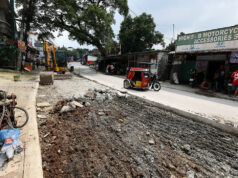Gov’t recovery strategy takes shape in House
A MAJOR government bank told Congress that its economic stimulus lending programs will be issued under less stringent risk-assessment conditions to facilitate the release of liquidity into the economy during the coronavirus disease 2019 (COVID-19) crisis.
“I got assurances from LBP (Land Bank of the Philippines, or LANDBANK) that their stimulus loans will be off-balance sheet, so they can be administered without the usual rigorous risk-based assessments that banks do. In terms of bank processes, that’s as good as it gets, so our committee is quite encouraged by the assurance,” Albay Representative Jose Maria Clemente S. Salceda, who is also the House Economic Stimulus Cluster Co-Chairman, said in a statement Tuesday.
Bangko Sentral ng Pilipinas Governor Benjamin E. Diokno also told legislators during the virtual hearing of the House Defeat COVID-19 committee on Tuesday that the central bank has effectively eased liquidity conditions by allowing banks to count their loans to small firms as reserves.
“We have freed up from P180 billion to P200 billion and we asked banks to lend the money to MSMEs (micro, small and medium enterprises),” he said.
Finance Secretary Carlos G. Dominguez III said the Philippine Export and Foreign Loan Guarantee Corp., will guarantee part of the loans banks extended to MSMEs to boost lending to small borrowers.
The House economic stimulus sub-committee on Tuesday released a draft bill, the Philippines Recovery Act, which calls for a P613-billion stimulus package to help workers and businesses deal with the effects of COVID-19.
The draft bill classifies economic measures to address COVID-19 as transitional, sectoral and structural interventions.
Transitional interventions are economic relief measures to be implemented immediately after the lockdown to avert permanent damage to the economy. These include wage subsidies worth P110 billion for critical businesses, the self-employed, freelancers and Overseas Filipino Workers.
Compensation for COVID-19 victims will be provided by the Social Security System and the Government Social Insurance System with a total funding of P1 billion. Regulatory relief for all business entities through the suspension or waiving of fees for licensing and payment deadlines is also included.
Sectoral interventions are relief measures intended for MSMEs, tourism establishments, farms and fishing communities, and other critical businesses.
These include the P10 billion in MSME assistance by the Department of Trade and Industry, a separate P25-billion loan program for MSMEs, a P10-billion loan program for the agri-fishery sector, a P43-billion program for tourism assistance by the Department of Tourism and P66 billion worth of trade assistance from the Board of Investments.
Sectoral interventions also include industrial policies such as the imposition of zero tariffs on imported raw materials, the suspension of export percentage requirements, and grants for technological innovation for COVID-19 related products.
Structural interventions include P48 billion worth of credit mediation and refinancing; P300 billion in zero-interest loans to businesses by LANDBANK and the Development Bank of the Philippines; and P650 billion for enhancing the “Build, Build, Build” program.
The bill also proposes the creation of the National Emergency Investment Corp. with P350-billion capitalization which is tasked to “rescue firms that fail due to an unforeseen economic crisis” through convertible loans, debt-to-equity swaps, or outright government purchases.
The draft authorizes the President to reallocate and realign the General Appropriations Acts of 2019 and 2020, and allocate cash, funds and investments held by any government-owned or controlled corporations or any national government agency to provide funding support for the measure.
It also orders the Department of Budget and Management to identify programs, projects, and activities which cannot be implemented effectively as a result of the COVID 19 outbreak. — Genshen L. Espedido



